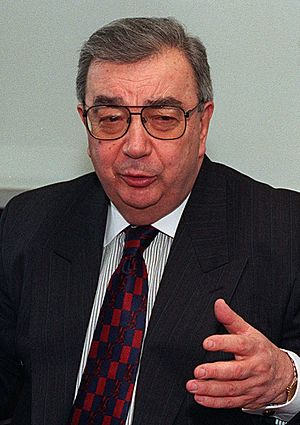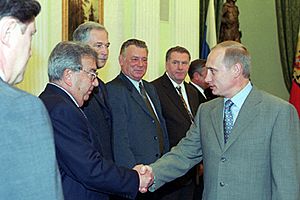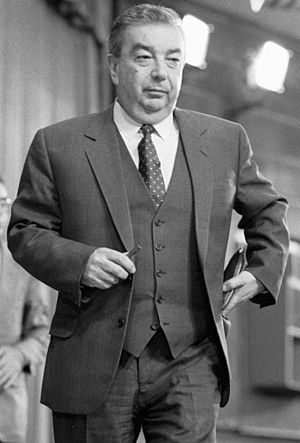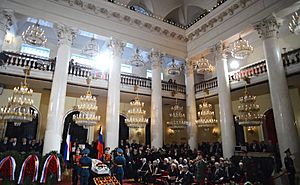Yevgeny Primakov facts for kids
Quick facts for kids
Yevgeny Primakov
|
|
|---|---|
|
Евгений Примаков
|
|

Primakov in 1997
|
|
| Prime Minister of Russia | |
| In office 11 September 1998 – 12 May 1999 |
|
| President | Boris Yeltsin |
| First Deputy |
|
| Preceded by | Viktor Chernomyrdin (acting) |
| Succeeded by | Sergei Stepashin |
| Minister of Foreign Affairs | |
| In office 9 January 1996 – 11 September 1998 |
|
| President | Boris Yeltsin |
| Preceded by | Andrei Kozyrev |
| Succeeded by | Igor Ivanov |
| Director of the Foreign Intelligence Service | |
| In office 26 December 1991 – 9 January 1996 |
|
| President | Boris Yeltsin |
| Preceded by | Position established |
| Succeeded by | Vyacheslav Trubnikov |
| Director of the USSR Central Intelligence Service | |
| In office 6 November 1991 – 26 December 1991 |
|
| Preceded by | Position established |
| Succeeded by | Position abolished |
| Director of the KGB First Chief Directorate | |
| In office 30 September 1991 – 6 November 1991 |
|
| Preceded by | Leonid Shebarshin |
| Succeeded by | Position abolished |
| Chairman of the Soviet of the Union of the Supreme Soviet of the USSR | |
| In office 3 June 1989 – 31 March 1990 |
|
| Preceded by | Yury Khristoradnov |
| Succeeded by | Ivan Laptev |
| Personal details | |
| Born | 29 October 1929 Kyiv, Ukrainian SSR, Soviet Union (now Ukraine) |
| Died | 26 June 2015 (aged 85) Moscow, Russia |
| Nationality | Russian |
| Political party | Communist Party of the Soviet Union (1950s–1991) Independent (1991–1998, 2002–2015) Fatherland – All Russia (1998–2002) |
| Children |
|
| Relatives | Yevgeny Primakov Jr. (grandson) |
| Alma mater |
|
| Occupation | Politician, journalist, diplomat, secret agent |
| Awards | |
|
Central institution membership
1989–1990: Candidate member, 27th Politburo
1989–1990: Full member, 27th Central Committee 1991–1996: Director, Foreign Intelligence Service
1991–1991: Director, Centre for Strategic Research 1991–1991: Director, KGB First Chief Directorate 1989–1990: Chairman, Soviet of the Union |
|
Yevgeny Maksimovich Primakov (29 October 1929 – 26 June 2015) was a very important Russian politician and diplomat. He served as Prime Minister of Russia from 1998 to 1999. During his long career, he also worked as the Foreign Minister, Speaker of the Supreme Soviet of the Soviet Union (like a parliament leader), and chief of Russia's intelligence service. Primakov was also a respected scholar and a member of the Russian Academy of Sciences.
Contents
About Yevgeny Primakov
Yevgeny Primakov was born in Kyiv, which is now in Ukraine. He grew up in Tbilisi, which is now in Georgia. His mother, Anna Yakovlevna Primakova, was a Jewish obstetrician, a doctor who helps with childbirth.
Primakov studied at the Moscow Institute of Oriental Studies. He graduated in 1953 and continued his studies at Moscow State University. His grandson, Yevgeny Primakov Jr., is also a well-known journalist, TV host, and diplomat.
Early Career and Journalism
From 1956 to 1970, Primakov worked as a journalist. He reported for Soviet radio and was a Middle Eastern correspondent for the Pravda newspaper. During this time, he often went on special missions to the Middle East and the United States.
In 1962, Primakov joined the scientific community as a Senior Researcher. He later became the Deputy Director of the Institute of World Economy and International Relations. From 1977 to 1985, he was the Director of the Institute of Oriental Studies of the USSR Academy of Sciences.
Primakov became involved in national politics in 1989. He was chosen as the Chairman of the Soviet of the Union. This was one of the two main parts of the Soviet parliament. From 1990 to 1991, he was part of Soviet leader Mikhail Gorbachev's special council. He even went to Iraq to talk with President Saddam Hussein before the Gulf War. He tried to convince Hussein to remove his forces from Kuwait.
Leading Foreign Intelligence
After a failed attempt to overthrow the Soviet government in August 1991, Primakov was given an important role. He became the First Deputy Chairman of the KGB. He also directed the KGB's First Chief Directorate, which handled foreign intelligence.
When the Russian Federation was formed, Primakov helped change the KGB's foreign intelligence part. It became the SVR. Primakov kept the experienced foreign intelligence team together. He led the SVR from 1991 until 1996.
Russian Foreign Minister
Primakov served as the Minister of Foreign Affairs from January 1996 to September 1998. As foreign minister, he was known for being a strong supporter of Russia's interests. He was also against NATO expanding into countries that were once part of the Eastern Bloc.
However, in May 1997, Russia signed an agreement with NATO. This agreement was seen as an end to the Cold War tensions. Primakov believed in multilateralism. This means that many countries should work together, rather than one country having all the power. He wanted Russia to focus on peaceful solutions. He also aimed to increase Russia's influence in the Middle East and former Soviet countries.
This idea became known as the "Primakov Doctrine." In 1999, he suggested that Russia, China, and India should form a "strategic triangle." This was meant to balance the power of the United States.
Prime Minister of Russia
In September 1998, President Boris Yeltsin chose Primakov to be the Prime Minister of Russia. This happened after the parliament did not approve Yeltsin's previous choice. As Prime Minister, Primakov was praised for making difficult but successful changes in Russia. One big success was the tax reform.
After a very bad harvest in 1998, Primakov asked the United States and Canada for food aid. He also asked the European Union for economic help.
Primakov was known for disagreeing with what he saw as the US acting alone in world affairs. This was popular with some Russians. However, it caused problems with Western countries during the 1999 NATO bombing of Yugoslavia.
On March 24, 1999, Primakov was flying to Washington, D.C. for a visit. While over the Atlantic Ocean, he heard that NATO had started bombing Yugoslavia. Primakov decided to cancel his visit. He ordered the plane to turn around and return to Moscow. This event became famously known as "Primakov's Loop."
President Yeltsin fired Primakov on May 12, 1999. The official reason was the slow economy. However, many people thought Yeltsin was worried Primakov was becoming too popular. Primakov had a good chance of becoming president himself. Primakov did not want to fire Communist ministers. This was happening while the Communist Party was trying to remove Yeltsin from office.
Primakov's dismissal was very unpopular with the Russian people. A poll showed that 81% of people did not agree with the decision. Yeltsin later resigned, and Vladimir Putin became president.
After Being Prime Minister
After his time as Prime Minister, Primakov continued to be an important figure. He supported a political group called Fatherland – All Russia. This group was a main opponent of the pro-Putin group called Unity. Primakov even thought about running for president. However, he later decided not to run in the 2000 elections.
Soon after, he became an adviser to President Vladimir Putin. On December 14, 2001, Primakov became the President of the Russian Chamber of Commerce and Industry. He held this position until 2011.

In 2003, he visited Iraq as a special representative for President Putin. He spoke with Iraqi President Saddam Hussein. He tried to prevent the US-led invasion of Iraq. Primakov suggested that Hussein should give up all of Iraq's weapons to the United Nations. However, Hussein was confident that he would be safe. Primakov later said that Hussein's execution in 2006 was rushed. He believed it was to stop Hussein from sharing information that could make the US government look bad.
In November 2004, Primakov spoke in defense of former Yugoslav President Slobodan Milošević. Milošević was on trial for war crimes. Primakov had met with Milošević during the 1999 NATO bombing of Yugoslavia.
On May 26, 2008, Primakov was elected to the Presidium of the Russian Academy of Sciences. In 2009, he received an honorary doctorate from the University of Niš in Serbia.
Primakov stepped down as President of the Russian Chamber of Commerce and Industry on March 4, 2011.
Death and Legacy
Yevgeny Primakov passed away in Moscow on June 26, 2015. He was 85 years old and had been ill for a long time. He was buried with military honors at Novodevichy Cemetery.
To honor Primakov, the Primakov Readings were started in October 2015. This is an annual international meeting. Experts, diplomats, and leaders from all over the world come together. They discuss important global issues like the world economy, international politics, and security. The Institute of World Economy and International Relations organizes this event in Moscow.
Awards
Primakov received many awards for his work, including:
- Order of Merit for the Fatherland 1st, 2nd, and 3rd Class
- Order of Honor
- Order of Lenin
- Order of the Badge of Honor
- Order of Friendship of Peoples
- Order of the Red Banner of Labour
- Medal "Veteran of Labour"
- Order of Friendship (Tajikistan)
- Order of Yaroslav I the Wise 5th Class (Ukraine)
- Order of Danaker (Kyrgyzstan)
- Order of Friendship of Peoples (Belarus)
- Order of Dostyk 1st Class (Kazakhstan)
- Order of the Republic 1st Class (Transnistria)
- Medal of Independence (Kazakhstan)
- Order of Jerusalem 1st Class (Palestinian National Authority)
- Demidov Prize
- USSR State Prize
- Nasser Prize
- Avicenna Prize
- George F. Kennan Prize
- Hugo Grotius Prize
See also
 In Spanish: Yevgueni Primakov para niños
In Spanish: Yevgueni Primakov para niños
- Yevgeny Primakov's Cabinet
- Yevgeny Primakov Jr.
- Operation INFEKTION
- Primakov Readings
 | Frances Mary Albrier |
 | Whitney Young |
 | Muhammad Ali |



